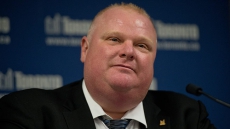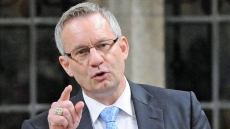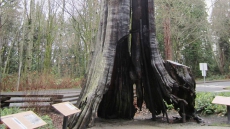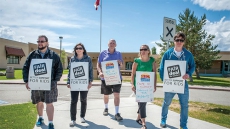OTTAWA - More than 400 academics are demanding the Canada Revenue Agency halt its audit of a think-tank, saying the Conservative government is trying to intimidate, muzzle and silence its critics.
In an open letter, the group defends the Canadian Centre for Policy Alternatives, a left-leaning think-tank that was targeted for a political-activity audit partly because it was deemed by the agency to be biased and one-sided.
The letter says the centre is internationally respected, conducting its research in a "fair and unbiased way," and that its frequent criticisms of government policies does not make it a partisan organization.
The group is calling for a moratorium on political-activity audits of think-tanks until the tax agency adopts a neutral and fair selection process.
One of the group's organizers, economist Mario Seccareccia at the University of Ottawa, says the letter tapped into enormous frustration with the Conservative government's hostility toward academic research.
"It's an environment that has been rather stifling when it comes to intellectual work," he said in an interview. "There's a real malaise. ... They've been irritating a lot of people."
Earlier this month, The Canadian Press reported on an internal tax agency document that outlined the rationale for auditing the Ottawa-based Canadian Centre for Policy Alternatives, registered as an educational charity.
The document said the research and education material on its website appears to be "biased" and "one-sided," triggering a political-activity audit in October last year.
The centre is among 52 charities currently targeted in a $13.4-million program launched in 2012 to determine whether any are violating a rule that limits their spending on political activities to 10 per cent of resources.
Auditors also want to see whether any charities are engaging in forbidden partisan activities, such as endorsing candidates for public office.
The first wave of such audits included environmental groups that have been critical of the Conservative government's energy and pipeline policies, but the net was later widened to include poverty, international aid and human-rights groups who are also often critical of policy.
The new audit program has led to what has been dubbed "advocacy chill," as some groups self-censor to avoid aggravating auditors. The audits are also draining scarce resources, especially through spending on legal fees.
Revenue Minister Kerry-Lynne Findlay has said the tax agency's political-activity audits are conducted at arm's length, without her input, and agency officials say their targeting decisions are neutral, non-partisan and balanced.
The open letter, addressed to Findlay, says the government appears to have singled out a think-tank that frequently criticizes the Conservative agenda.
"We are therefore left with the conclusion that the decision to audit the CCPA is politically motivated to intimidate and silence its criticisms of your government policies," says the text, endorsed by 421 academics by mid-day Sunday.
"Instead of trying to muzzle and impede sound and legitimate research, it is now time for you to try to promote more effectively the public good in the form of sound critical research for which Canadian researchers are respected internationally."
Organizer Louis-Philippe Rochon, an economist at Laurentian University in Sudbury, Ont., says endorsements for the letter arrived quickly.
"This was a powder keg waiting to happen," he said, noting the support was broad-based.
"Mostly from the social sciences and humanities, but some from the sciences. We have Canada Research Chairs, heads of departments, younger faculty, more established faculty, and from almost every university in Canada."
"It hit a raw nerve amongst academics," he said in an email. "The idea that if we reach a conclusion other than the official doctrine of the government, our research is somehow biased and political."
Most think-tanks in Canada are registered as educational charities to allow tax breaks for their donors.
Two right-leaning think-tanks, the C.D. Howe Institute and the Macdonald-Laurier Institute, have confirmed they are not currently undergoing CRA political-activity audits. Two others — the Fraser Institute and the Montreal Economic Institute — have declined to comment. The Atlantic Institute for Market Studies in Halifax has not responded to questions.
Text of letter from academics on CRA audits
Dear Minister Findlay,
Recently, we were informed through reports in a number of newspapers that the Canada Revenue Agency (CRA) has undertaken an audit of the Canadian Centre for Policy Alternatives (CCPA) on the grounds that it allegedly engages in politically partisan, biased and one-sided research activity.
While we understand the need to prevent abuses of the charitable status, we are rather perplexed at CRA’s decision to perform the audit on this basis. The CCPA is an internationally-recognized and respected research centre, built on a solid tradition of critical analysis. Indeed, the CCPA plays a vital role by supplying much needed reflection on a number of policies, which it has always done in a fair and unbiased way, and which respects the fundamental tools of sound research. They have produced much-needed research on many disparate topics, such as on income and wealth distribution, the hidden government support of the Canadian banking sector during the financial crisis, and an analysis of alternative federal fiscal policy implementation annually. Since these various research studies are academically all of very high quality, you can therefore imagine how this news took us by surprise.
By undertaking this audit, we feel that CRA fails to understand the nature of what academic research is all about. Research begins from a series of questions and observations, and, from there, it proceeds, following a set of guidelines, to infer possible answers. In this sense, it contests. All research in fact is critical, by its very definition: it tests hypotheses, seeks answers, and must be allowed to find these answers wherever it can.
But critical policy analysis does not equate with political activism, nor is it “biased” or “one-sided”, as CRA has claimed. Researchers explore specific questions of interest, and then present the results of their research. Reaching a conclusion is not the same as bias. To illustrate, a CCPA researcher explored the issue of what would be the appropriate exchange rate regime for Canada and then concluded that a floating exchange rate was desirable to alternative types of exchange rate mechanisms because the former allowed the public authorities to conduct independent macroeconomic policies. The fact that this conclusion turned out to be similar to the policy view of the Bank of Canada does not make the CCPA researcher any more political than if the researcher would have produced that same research independently within his/her respective university.
The CCPA is not a political organization, nor does it engage in political or partisan activities. The fact that it has criticized government policy on a number of issues does not make it a partisan organization promoting a narrow agenda. Rather, it is engaging in serious, unbiased academic research. It may reach a different set of conclusions from those of the government, but then, this is allowed in a free-thinking, democratic country. On the contrary, we would argue, that such dissent should be encouraged and not stifled by such actions of the CRA.
Indeed, if there is bias, the bias seems to be mostly in the CRA’s decision to audit the CCPA and apparently no other think tanks, whose policy conclusions are friendlier toward current government policies. We are not aware of any audits being launched regarding “bias” at conservative think tanks like the Fraser Institute; some have publicly confirmed that they are not being audited (including the Macdonald-Laurier Institute and the C.D. Howe Institute). We are therefore left with the conclusion that the decision to audit the CCPA is politically motivated to intimidate and silence its criticism of your government’s policies.
We therefore strongly urge the CRA to put a moratorium on its audits of think tanks, until such time as a truly neutral criteria and auditing process are implemented to ensure neutrality and fairness, and to ensure that the audit process does not silence dissenting voices. Periodic audit should be conducted in a fair, transparent, and even-handed fashion across all the various think-tanks that claim charitable status in Canada, with a focus on financial management and integrity (not on the content of the research being conducted). Why single out only one such research centre that happens to be more critical of government policy? Instead of trying to muzzle and impede sound and legitimate research, it is now time for you to try to promote more effectively the public good in the form of sound critical research for which Canadian researchers are respected internationally.






